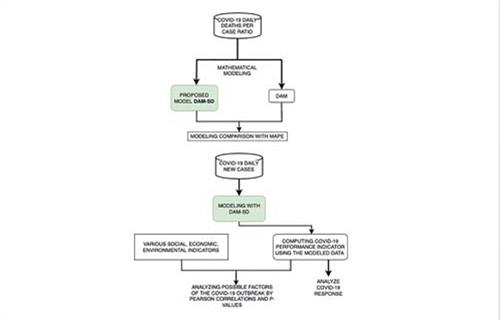Informatics Institute faculty member Ertuğrul Karaçuha and Vasil Tabatadze coauthored paper titled 'Analyzing Response Efficiency to COVID-19 and Underlying Factors of the Outbreak With Deep Assessment Methodology and Fractional Calculus' has been published in '
IEEE Access' on 22 November 2021.
DOI: 10.1109/ACCESS.2021.3129904
Abstract:
This study focuses on modeling the daily deaths per new case of COVID-19 by using the Fractional Calculus and the Least Squares Method. Based on our prior work, we proposed a new modeling approach, assessed the strength of outbreak response, and analyzed possible underlying factors of the outbreak for 8 countries including China, France, Germany, Italy, Russia, Spain, the UK, and the US. First, we modeled weekly deaths per new case of COVID-19 using our new modeling method Deep Assessment Methodology - Second Derivative (DAM-SD). Later, we defined a performance indicator to understand how well each country copes with the pandemic. Lastly, Pearson correlations between the performance indicator and several economic, social, and environmental indices, such as Human Development Index, Human Freedom, Democracy, Competitiveness, and Trust Index are computed, and p-values are reported. Results showed that DAM-SD successfully models the daily new cases of COVID-19 with 3.7390% Mean Average Precision Error and outperforms the DAM by 1.5678% MAPE. China is the best-modeled country with 4.0975e-08% MAPE whereas the model produced the highest error rate for France as 8.8317% MAPE. According to the analysis with the performance indicators, China is the most successful country against the pandemic while the United States and France fail to confine COVID-19 outbreak compared to the others. Indicators such as Human Development Index, Human Freedom, Human Democracy, GINI Index, Workers Rights, the Trust Index, and Air Pollution are found significant for COVID-19 response according to the p-values. In the correlation analysis, Average Class Size, Government’s Long Term Vision, Responsiveness to Change, Better Life Index, and Population Density were the least significant indicators. Long Term Care Beds, Social Capital, and Global Social Mobility indicators are found correlated with the COVID-19 response. Household Spending and Student Skills are found insignificant.
